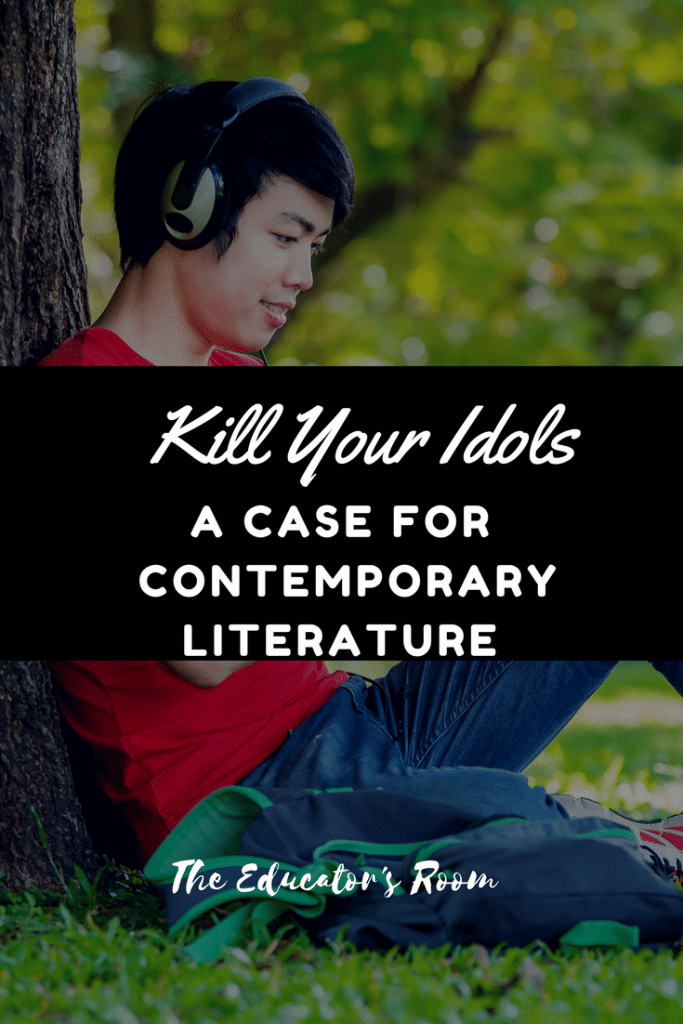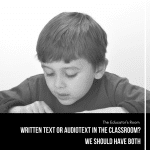When I go out to eat, I often eavesdrop on the conversations of my fellow diners. Not long ago, I listened in on a particularly interesting discussion that involved two teachers. They were discussing a familiar quandary among English teachers: What are the virtues of teaching classical literature to a generation who just doesn’t get it? It’s a question I’ve asked myself from time to time. Do my students need to read Hemingway? Does The Scarlet Letter possess some profound effect on their future happiness and success? Or are they so far removed from the characters in events in classical literature that it’s doing them no good?
After opening this can of worms, I realized that this hero worship of our artistic predecessors extends beyond literature. If I searched the words “best bands of all time” online, I would be hit with hundreds of sites extolling The Beatles, Bob Dylan, and Led Zeppelin. Nirvana might sneak in there at some point, but still, you’re looking at a twenty-year gap between them and today’s musicians. Does this mean that our generation is devoid of artistic merit that will be discussed and taught about in schools? Or are we romanticizing a bygone age because we’re too cynical to believe that contemporary art, music, and literature will ever be as viable as the classics?
I don’t know.
Let’s talk about it anyway.
My motivation to reach closure on this subject comes from my work as an educator. I want to help students become successful members of society, and helping students understand the mysteries of reading, writing, and literature is a big part of that process. The hardest part of this endeavor is to show young people how a book like The Great Gatsby applies to their lives. Sometimes I’ve thought it would be easier to drop it and teach something by John Green, but I think there is value in exploring the style of a previous generation and discussing its impact on today’s society. The ability to perfectly encapsulate the generation in which they lived is one of the reasons that Fitzgerald, Whitman, Hemingway and Shakespeare are timeless authors. This might be why English teachers love them so much.
I’ve noticed that most students don’t share this affection, however. And that’s okay. I teach them lots of things that they don’t love. I would never completely abandon the classics, because they not only show us so much about the past, but they show us how we got to the present. I also believe that the focus and attention that the classics require are beneficial skills to help combat the dwindling attention span of the American teenager.
That being said, I don’t want students to think that there is no good literature being produced today. Teachers should foster a love of reading in their students, and if we convince them that worthwhile literature expired when America rose from the ashes of the Great Depression, then it kills their motivation to get out and discover the voices of their generation. This is why I’ve never joined in any Twilight bashing. It doesn’t fit my own definition of great literature by any stretch of the imagination. But the vampire revivalism that followed in its wake proved that it was culturally relevant, and the plethora of paranormal YA literature that was produced as a result of its popularity proved that it did influence the literary world. Isn’t cultural relevance and literary influence part of the reason why we hold onto the classics? And did I just inadvertently put Stephanie Meyer on the same playing field as Jane Austen?
At the end of the day, I’m the kind of English teacher who struggles to reconcile an interior struggle between a traditional book snob and an anarchic punk rocker. I see the classics as the foundation of contemporary literature, but at the same time, I want to tear that foundation down to show that this generation can create meaningful art and literature just as well as any other. I haven’t quite figured out how to do it yet, but I’m open to suggestions.





Why does it have to be either/or? Comparative literature studies are enriching and help to make those significant connections you seek.
As an individual I read and enjoy both classic and contemporary literature. However, as a parent and a teacher I recognize that popular books and quality books are not necessarily the same thing. Thus, I believe that the classics should be emphasized over contemporary works in the classroom. One of the reasons we still teach the works of Dickens, Austen, and Shakespeare is that they have endured the test of time. Many of these authors' contemporaries were widely read at the time, but those works did not continue to touch hearts and inform minds across decades or even centuries. If the Harry Potter books are still being widely read and acclaimed in 50 or 100 years, then J.K. Rowling will truly have joined the ranks of A. A. Milne and J. M. Barrie. If the Twilight series has retained a measure of popularity into the next half-century, then Stephanie Meyer can take her place in history with Jane Austen and J.R.R. Tolkien. As teachers we should not discourage our students from reading contemporary literature, but a failure to introduce them to the classics benefits no one.
What I find most difficult in the classics is getting kids through the vocabulary; it becomes such a struggle that I wonder if it's worth the effort. Is it bad to use annotated or other versions of these classics just so that students can at least be exposed to them? Perhaps instead of reading the entire book, break it up into excerpts, show clips from films, etc? At least this would expose them to the stories, but not overwhelm them with the magnitude.
I have to agree that classics cannot be completely abandoned, but on the other hand contemporary literature (post 2001 in my opinion) should also be a part of the classroom because it has influence as well. In 20 or even 50 years books from the early 2000s will be taught in the classroom in a high regard just as To Kill a Mockingbird has been for many years now (whether or not you believe it is a novel of merit is a personal opinion, but it is widely taught). So introducing literature published within the last 10 or 12 years is an excellent idea in my opinion because there are many novels which have been published that are worth teaching depending on your age group. There is adolescent literature as well as adult literature that is wonderful such as the Unwind series or Gilead which could greatly contribute to a classroom discussion and still show literary merit.
I fear that as education stands today, we are robbing our students of the ability to read a variety of literature. Reading is of the utmost importance in any endeavor. When we take any book out of a person’s hands we are then promoting thought control. Any piece of literature, whether contemporary or the classics can and should be available to all students. As educators it is our duty to facilitate and mentor our students to read and DISCUSS, what they are reading and how it is relevant to their lives, what lessons it teaches, and what ideas are espoused. Yes, it can be a struggle to teach the classics, but we must not sell our students out, just because it is hard. I really want to teach Fahrenheit 451.
Literature is the highest form of reading; and therefore it should be taught. As my son, who absolutely hates reading, said when he spoke about reading the Bible,, “each word should be analyzed, even the culture and time period…just like we do in literature.” And yes, I informed him that the Bible is literature. If students can understand lit, then they can read anything.